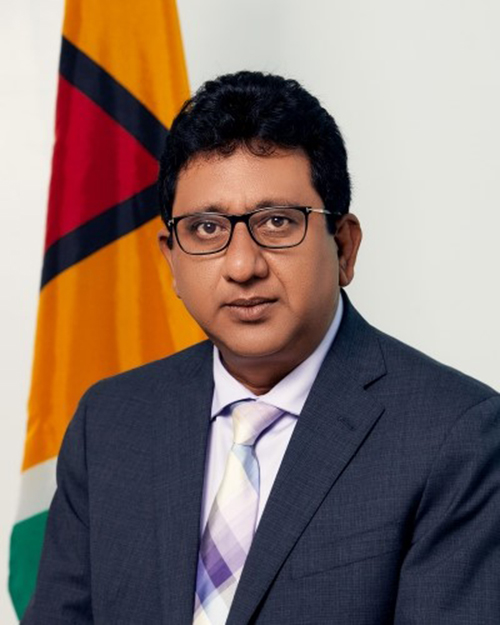Arguing that the Court of Appeal lacks jurisdiction to hear the matter, Attorney General (AG) Anil Nandlall SC has filed a motion seeking to strike out the appeal filed on behalf of the main opposition APNU+AFC coalition over the dismissal of one of its two petitions challenging the March 2, 2020 elections.
In January, acting Chief Justice Roxane George-Wiltshire SC threw out the petition, brought by Monica Thomas and Brennan Nurse on behalf of the coalition, after finding that the APNU+AFC presidential candidate David Granger was not served on time.
Thomas and Nurse subsequently appealed the ruling, arguing, among other things, that the Chief Justice erred in law and misdirected herself by misapplying the doctrine of strict compliance and holding that such compliance related to the contents of the affidavit of service instead of the filing of the affidavit of service in a timely manner.

They were seeking to have the court nullify the outcome and to declare President Irfaan Ali to be illegally holding office.
However, in his notice of motion, Nandlall advances the position that the appellate court lacks the jurisdiction to hear the appeal.
He notes that Article 163 (3) of the Constitution provides that an appeal of an election appeal does lie to the Court of Appeal, but not in the instance such as the ruling made by the Chief Justice for dismissal of the petition on the basis of procedural irregularity.
Instead, the AG argues that an appeal of a petition lies to the local appellate court from decisions in the High Court on the granting or refusing of leave to institute proceedings for the determination of any question referred to in Article 163 (1), or any order made in consequence of such determination.
Against this background, the AG has advanced the argument that the Chief Justice’s decision is not a decision granting nor refusing leave to institute proceedings for the determination of any question referred to in Article 163 (1).
He further states that Justice George-Wiltshire’s decision was not, and did not involve, a determination of a question referred in the referenced Article, or any order made in consequence thereto.
He states in the grounds for his application that the election petition jurisdiction of the High Court is sui generis (in a class by itself) and that the jurisdiction of the Court of Appeal to hear an appeal from a decision of the High Court in an election petition must be founded in the Constitution or statute.
His position is that “the High Court has no inherent jurisdiction regarding its adjudication of an election Petition,” while further adding that there is no statutory or constitutional instrument granting jurisdiction to the Court of Appeal to hear an appeal of an election petition dismissed for procedural impropriety, or any other reason not stated in Article 163 (1).
Through Solicitor General (SG) Nigel Hawke, the AG argued that because of the peculiar and special nature of the election petition jurisdiction of the High Court, the principles of law and procedural rules and regulations attendant thereto are treated, interpreted and applied with a degree of rigidity, which distinguishes its jurisdiction from any other.
On this point, he noted that the petitioners’ failure to serve the petition documents on Granger within the time specified by the National Assembly (Validity of Election) Rules (NAVoER) was fatal to the entire petition, as a consequence of which it was dismissed.
Article 163 (3) confers exclusive jurisdiction on the High Court to determine questions
(a) regarding the qualification of any person to be elected as a member of the National Assembly;
(b) whether –
(i) either generally or in any particular place, an election has been lawfully conducted or the result thereof has been, or may have been, affected by any unlawful act or omission;
(ii) the seats in the Assembly have been lawfully allocated;
(iii) a seat in the Assembly has become vacant; or
(iv) any member of the Assembly is required, under the provisions of Article 156 (2) and (3) to cease to exercise any of his or her functions as a member thereof;
(c) regarding the filling of a vacant seat in the Assembly; or
(d) whether any person has been validly elected as Speaker of the Assembly from among persons who are not members thereof or having been so elected, has vacated the office of Speaker.
Hawke pointed out in his affidavit supporting the AG’s motion that Section 3 (2) of the National Assembly (Validity of Election) Act (NAVoEA) provides that every question under Article 163 (1), (a), (b) and (c) shall be referred to the court by an election petition and that the term “court,” in accordance with the NAVoEA, is defined to mean the High Court.
Hawke added that appeals regarding an election petition are governed exclusively by Article 163 (3), while reemphasizing the AG’s point that the Chief Justice’s decision was not, and did not involve a determination of a question referred to in Article 163(1).
Hawke contends that outside of this, there is no statutory or constitutional instrument granting the Court of Appeal jurisdiction to hear an appeal of an election petition dismissed for procedural impropriety or any other reason not stated in Article 163 (1).
The SG argues that in the circumstances, permitting the petitioners’ appeal would be “unlawful, irregular and unconstitutional.”
Apart from their contention that the Chief Justice erred in misapplying the doctrine of strict compliance, Thomas and Nurse also argue that she misdirected herself in concluding that leave was required to file a supplementary affidavit of service to give a more complete understanding of how service was effected on Granger and misdirected herself by failing to recognise that the purpose of Rule 9 of the NAVoER, requiring service of an Affidavit, is to verify that service was achieved within the time prescribed by the statute, and that an error in the Affidavit does not affect the fact of service.
The petitioners contended, too, that the chief judge erred in her finding that Granger was a proper and necessary party to the petition.
Dismissing the contention advanced by attorneys for the petitioners, however, Justice George-Wiltshire had said that there was compelling evidence to support the respondents’ argument that Granger—a proper and necessary party to the petition—was not served with the petition on time as required by law.
Thomas and Nurse are being represented by a battery of attorneys led by Senior Counsel Roysdale Forde.
The results of a national recount of all ballots cast showed that it was the PPP/C which had the general elections with 233,336 votes over the coalition’s 217,920 votes.
In the other petition, which is proceeding, petitioners Claudette Thorne and Heston Bostwick want the court to determine, among other things, questions regarding whether the elections have been lawfully conducted or whether the results have been, or may have been affected by any unlawful act or omission and, in consequence thereof, whether the seats in the National Assembly have been lawfully allocated.
This petition comes up for hearing before the Chief Justice on April 7.




